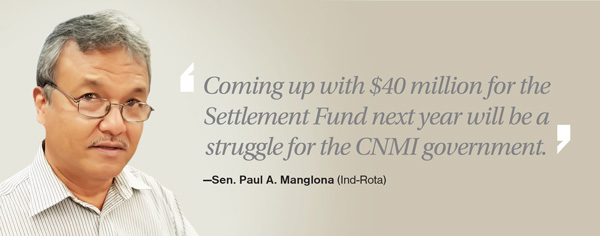‘It will be a struggle next year’
The move to revoke the casino license of Imperial Pacific International (CNMI) LLC is concerning as, according to Sen. Paul A. Manglona (Ind-Rota), this means the government will struggle starting next year with paying the $40-million minimum annual payment to the NMI Settlement Fund.
The CNMI may be fortunate this year to have the American Rescue Plan Act money to subsidize government operations across the board, Manglona said, but it appears the CNMI may be going back in the coming years to when it was plagued with lack of revenues.
“And I hope not to see the day when we have to cut 25% [of benefits] from the retirees,” he said Friday at a Senate session.
The Settlement Fund is obligated to pay CNMI retirees 75% of their benefit payments. The government has the discretion but not obligation to cover the remaining 25% balance.
Settlement Fund trustee Joyce C. H. Tang has repeatedly praised the dedication of the Torres-Palacios administration to finding ways to continue to make the government’s 25% contribution even in these challenging times.
Manglona noted Friday the recent filing by Commonwealth Casino Commission executive director Andrew Yeom of four complaints against IPI, each of them seeking the immediate revocation of IPI’s exclusive Saipan casino license, for alleged unwillingness to comply with CCC’s final order in four enforcement actions that were entered over five months ago.
“And this concerns us greatly because it would mean that next year and in future years, we’re going to really struggle with the minimum annual payment for the [Settlement] Fund,” he said. Manglona said everybody knows that the main intent of Public Law 18-56 in establishing the Saipan casino industry is so that the government can take care of the retirees as well as other financial difficulties of the CNMI.
The senator said he and Sen. Edith E. DeLeon Guerrero (D-Saipan) wrote Senate President Jude U. Hofschneider (R-Tinian) last July about possibly creating a special committee to look at Senate Bill 22-23 and Senate Joint Resolution 22-01 that they introduced last February and March, respectively.
Senate Bill 22-23 seeks to authorize the CCC to issue a second casino license in the event that IPI’s exclusive casino license is revoked.
SJR 22-01 will request Gov. Ralph DLG Torres to instruct the CNMI representative on the Development Plan Advisory Committee to immediately provide a report to the Legislature on the casino projects.
Manglona asked the Senate to maybe come up with a position paper about the revocation matter because IPI acting chief executive officer Ray Yumul was quoted as saying that they’re fine with removing the exclusivity clause but just don’t revoke their license. He said Yumul further stated that they continue to discuss alternative solutions with the administration and the Legislature.
“So I don’t know what discussions are taking place with the Legislature,” the senator said.
Manglona said it’s the reason why the Senate should possibly call for an oversight or public hearing on their two legislations, and hear comments from the community as to how they can best address the IPI issue and the casino industry.
He said some of the issues that they would like IPI and CCC to discuss with the Senate are concerns about IPI’s growing debts, DPAC fees, CCC annual regulatory fee, community benefit fund, and annual casino license fee.
The senator said IPI is now on its second year of failing to pay the annual regulatory fee and annual casino license fee.
He said the Senate should know what is IPI’s plan of action and all labor enforcement issues.
Mainly, Manglona said, they want to talk about establishing a strong culture of compliance at IPI and the casino exclusivity provision.
The senator reiterated a request with the Senate leadership for a committee—such as the Fiscal Affairs Committee or the Committee on Resources, Economic, Development and Programs or possibly creating a Committee on Gaming—so that “they can be ahead of the ball and be ready.”
Last February, Hofschneider disclosed that IPI paid a total of $204.80 million in taxes, license, and fees from 2015 to 2018, and that it was IPI’s contributions that saved the CNMI’s Retirement Fund from collapsing.
























